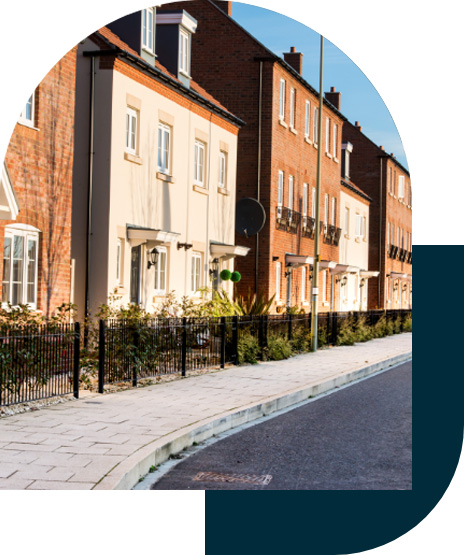Re-Mortgaging is the process of switching your current mortgage onto a new product with the same or a different lender.
If you are transferring to a new Lender, you should contact HSR Law to guide you through your remortgage. HSR Law can also assist with adding somebody to your property or removing somebody from your title, but this is a slightly different process which can be found under the Transfer of Equity section on the website.
The three main reasons that people remortgage are:-
- To release equity. A lump sum that is tied up in the property
- Transfer to a longer fixed term rate
- Receive a better deal to allow the mortgage to be paid off sooner.
The conveyancing process for a remortgage
Step One: Finding your new Mortgage
Look around and get the best deal suitable for you. You should look at the terms and conditions of your existing mortgage as you may have to pay fees for paying off your mortgage early. It may be that a mortgage broker can assist you here.
Step Two: Instructing a conveyancing solicitor
Once you’ve got a remortgage offer in writing from your new provider or your mortgage advisor, you should contact HSR Law. HSR Law will check the Title to the Property and liaise with the Lender you have to chosen to see if searches are required.
Step Three: Requesting a Redemption Statement from previous Lender
Once the searches (if required), and title deeds have been checked and HSR Law are satisfied, we will obtain a redemption statement from your current lender. This makes your current lender aware that you are looking to pay off your existing mortgage.
HSR Law will then send you a document called a Mortgage Deed which you will be required to sign, this binds you to the terms of the new Mortgage, once we complete.
Step Four: Completion Day
On the day of completion, HSR Law will receive funds from your new lender. HSR Law will then redeem/pay off your old mortgage balance with your old lender. Any surplus money will be sent to you. This will be shown on the completion statement that we will prepare for you.
HSR Law will then submit an application to the Land Registry and request for the previous lender be removed from the Title Deeds and replaced with your new mortgage provider.
HSR Law will receive updated title deeds for your property, check the previous lender has been removed, new lender has been added, check all parties are stated properly as the owners and then the document will be sent to you along with a receipted invoice.


We are CQS Accredited
The Conveyancing Quality Scheme (CQS) accreditation demonstrates that HSR Law Solicitors can provide residential conveyancing advice of the level expected by clients, lenders and the wider residential conveyancing community.
Being CQS accredited means we have the expertise to deliver quality residential conveyancing advice and use standardised processes to manage and reduce risks.
Your Remortgage Team
Property FAQs
Exchange means that your contract to purchase is now legally binding. If you withdraw from the sale, you will lose the deposit you paid. On exchange you also set the date for completion.
No, your Lenders grant the mortgage but they ask us to confirm that the valuation has no errors and that there are no issues with the property that they should be informed of. It is our job to ensure that both you and your Lender are happy to proceed.
Someone over 18 has to witness your documents and no one that is related to you
The ISA can only be used as part of completion funds to pay the balance of the property. It cannot be used as the deposit. Your buyer’s solicitor may agree to accept a lower deposit on exchange. Your solicitors can charge £50 plus VAT for applying for this for you.
If you are a cash buyer this is your choice, but HSR Law would always advise that you do obtain searches . If you are purchasing with the aid of a mortgage, this is mandatory. The main searches are as follows:
Local Authority
A local authority search will provide you with detailed information about your property and the surrounding areas including planning entries and road adoptions. This will give you peace of mind before going ahead with the purchase of your new home and ensure you avoid any surprises in the future
Water and Drainage
A water and drainage search will confirm the proximity of the property to public sewers, whether the property has a sewer running within the boundaries of the property and if the property is connected to mains services.
Environmental search
An environmental search would confirm whether the previous land use of the property creates a potential environmental risk. This search will highlight issues which would include:
Landslides
Subsidence
Contaminated land such as historic landfills and waste sites
The risk of flooding from nearby rivers or seas
Mining search
A mining search is required if the property is situated in an area of previous or current mining history and is at risk of being built on unstable ground.
If you hold the property as joint tenants, both of you will own the whole of the property. You will not each have a quantified share in the property and will not be able to leave a share of the property in your will. If you sell the property, or if you separate, it will be presumed that you both own the property equally.
If you hold the property as tenants in common, each of you will own a specified share in the property. For example, one owner could own 70% of the property while the other holds 30%. The percentage shares are commonly used to reflect the amount of money contributed.
If you buy a property freehold, it means you completely own the property and the land it sits on
When you buy a property that is leasehold, you own it for a set length of time, which is the term of the lease.
Click here to read our Freehold vs Leasehold factsheet.












